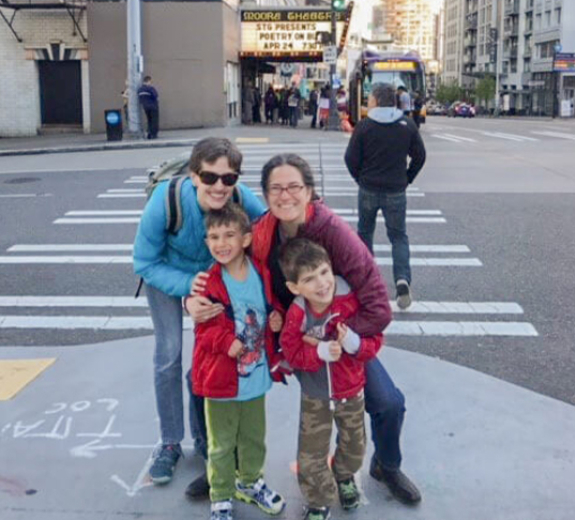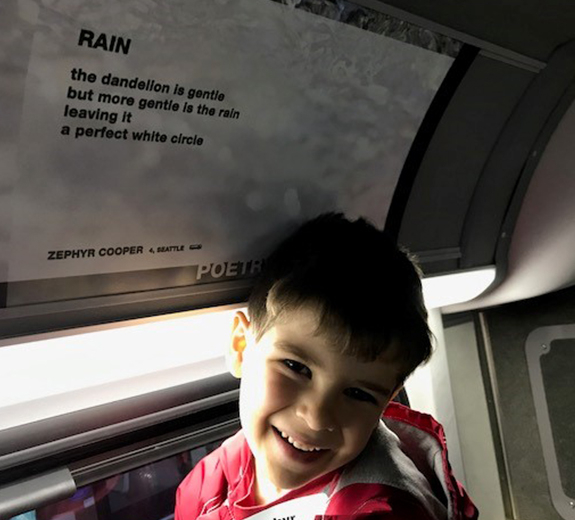Difficult for Parents
It’s not easy on the parents either. Rachael explains that it’s difficult and scary to send your child “to camp, school, temple, and the world, not knowing how vigilant others will be checking for food allergens. Peanut is found everywhere because of peanut flour, peanut oil and other peanut products.” It is hard to let your child explore the world, when he doesn’t even know when and where he will encounter peanuts.
Fortunately, Zephyr is learning to read, which will open a new world of independence for him. Zephyr is excited to gain more control over his disease by being on the lookout for peanuts himself. As Zephyr proudly announced, “I will be able to read food labels myself, so I can look for peanuts!”
Luckily, Zephyr has the full love and support of his family as he deals with his allergy. Rachael and Stephanie practice with the boys how to administer epinephrine injections in case Zephyr has a serious allergic reaction. “Zachary is kind and very protective of Zephyr, which helps us in our vigilance,” says Stephanie. “The boys are best friends and competitors – they delight in each other and crack each other up.”
Looking to Research for Hope
While managing their daily challenges, the entire family looks to research for hope. Rachael and Stephanie learned about the cutting-edge research being conducted at Benaroya Research Institute at Virginia Mason (BRI) from Zephyr’s Virginia Mason allergist, Mary Farrington, MD. Virginia Mason physicians and BRI scientists work closely together on many aspects of allergy research.
“We ultimately wanted to contribute to science and help make the world safer for people with severe food allergies,” say Stephanie and Rachael. That led to Zephyr and Zachary joining the BRI biorepository.
At BRI, a crucial tool for advancing medical research is the collection of biological samples called a biorepository. These samples are mostly blood donations from volunteers, like Zephyr and Zachary, which are analyzed by scientists and used in research to identify ways to prevent, diagnose, treat and, hopefully, cure many types of autoimmune and allergic diseases.
Twin Research Heroes
While Zephyr donated a sample to the Allergy and Asthma Biorepository, Zachary donated blood to the Healthy Control Biorepository. By bravely donating their blood samples, Zephyr and Zachary became superheroes and partners with BRI scientists in the fight against autoimmune and allergic diseases. Though Zachary does not have an autoimmune disease or allergies, his contribution is invaluable for scientists who look for differences between the immune systems of those with and without disease.
Why do scientists need blood samples from children, as well as adults? A young child’s immune system is typically less complicated than an adult’s. As children age, their immune systems’ become altered by the environment. For example, through exposure to the environment, a child’s body may develop allergic responses to things that it shouldn’t. Also, an allergy that is present in childhood may be outgrown by the time they reach adulthood. Since so many changes occur between birth and adulthood, it is important for BRI scientists to study the immune systems of children with and without disease.
“Once Zachary heard he could earn $50 AND help his brother, he was interested,” says Rachael. “Giving blood is uncomfortable and the boys felt a little nervous, but they did really well. The BRI staff were very kind.”
Breakthrough Science
Samples donated to the BRI biorepositories by participants were crucial in a recent breakthrough in allergy research. Scientists at BRI, led by Erik Wambre, PhD, made the discovery that could change allergy research worldwide. They identified a single type of cell called TH2A that appears to drive all allergies. This is a promising discovery because the cell can be targeted for new treatments and possible cures for all allergies, not just one. Additionally, the cell could be used as an indicator to show whether a person has an allergy or is responding to therapy.
As part of his allergy research, Dr. Wambre is also working to better understand the mechanisms behind innovative oral immunotherapies, which are currently in trials at Virginia Mason. The research is testing if people can become desensitized to peanuts by taking small amounts of peanut powder each day, increasing the dose until they no longer have a reaction to peanuts or have only a mild reaction. Rachael and Stephanie became aware of the clinical trials and are interested in allowing Zephyr to participate in them.
Children Participating in Science
Would they encourage other parents to consider having their children participate in the research being conducted at Virginia Mason and Benaroya Research Institute?
With hope for the future, these two parents say, “Yes, but only as long as it is right for that child and family. It is a great opportunity and a wonderful effort to gain more information regarding pediatric allergies, but it must be right for that person. It is empowering for children to feel like they are contributing. Children have a lot of opinions and feelings, and much to contribute. They are not always empowered to change their world, but this is an exception.”




